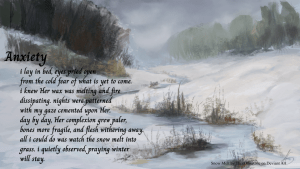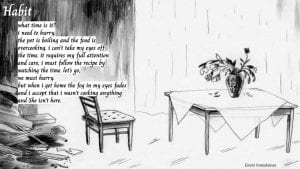Mourning Time
This project is one of two pieces in a collaboration with Isaiah Hwang. Our projects center around the topic of expected death and the emotional repercussions surrounding anticipatory grief. My project focuses on the stages before and immediately after the death of a family member, touching on the more abstract and metaphysical components of grief. Isaiah’s project focuses on statistical and material research tied into a legal argument surrounding end-of-life healthcare and emotions after the death of a family member.
You can reach his project here:
Abstract
Anticipatory grief unlocks vaults of human emotion that are wildly confusing yet seldom addressed. As opposed to conventional grief that occurs after death, anticipatory grief mourns the death of a loved one before they have died. Terminal diseases such as cancer often fall within this category, however anticipatory grief in cases of old age are extremely pervasive within people’s lives. In this piece, I aim to explore these emotional complexities that surround the expected death of a loved one in contexts of the immigrant experience. Inspired by the recent anniversary of my great-grandmothers’ death, this piece presents a series of poems from the voice of the griever that expose emotions within Asian American immigrant perspectives on anticipated death. To create these vignettes, I conducted interviews with Asian American immigrants exploring their narratives and accompanying emotions surrounding the expected death of a loved one due to natural causes. I interviewed Taiwanese immigrant Hsiao Shan Hu on the death of her father Hu Ying Chu and Vietnamese immigrant Trang Pham Nguyen on the death of her mother Trinh Thi Sao. Because of the heavy nature of the topic, the interview format followed an extemporaneous method to allow for more comfortable expression of emotion. I interweave mental health sources on how to cope with anticipatory grief as well as sources on feelings of indebtedness towards parental sacrifice. In my poetry, I use elements from Rafael Campo’s and Guo and Lang’s articles on the consoling powers of poetry to bring out more lyrical and expressive language. Emotions ranging from gratefulness, fear, and acceptance within these poems can be mapped onto other lives; particularly, the lived experiences of immigrants and what emotions course through their lives when dealing with expected death. These poems constructed from narratives gathered from interviews will hopefully help immigrants or generations born from immigrants who are experiencing anticipatory grief cope with the quite perplexing, nonlinear emotions that accompany loss.
PART 1: Sacrifice and Gratefulness
After divorcing her husband and moving to South Vietnam with her two children, Trinh Thi Sao had many opportunities to remarry. However, she refused to ever remarry out of the fear of having another child and being forced to neglect her current children. Trang Pham Nguyen mentioned that she felt no disdain in taking on the role of the caregiver simply because of her will to make her mother happy as well as out of thankfulness. In the same manner, Hsiao Shan Hu discussed her thankfulness to her father Hu Ying Chu for always being faithful to his family, putting family first above everything else.
Many articles and studies such as Toyama and Honda’s study on anticipatory grief of the caregiver and Kang and Reed’s study on indebtedness unveil feelings of obligation and feeling trapped. They pinpoint how children of immigrants, especially Asian American immigrants, feel some contempt towards their responsibility to take care of their parents, seeing it as almost a burden. However, both Nguyen and Hu’s feelings directly oppose these findings. Their respect and thankfulness towards their parents influence the willingness to caregive as opposed to feelings of entrapment.
“When I think of her I think about sacrifice. She sacrifice her life and own happiness for me. I don’t ever want to make her sad, I am so thankful. I always want to please her. I did well in school to make her happy. I take care of her to make her happy. Not out of obligation.” -Trang Pham Nguyen
“My father always [paid] attention to family. Family is his priority, even though his personality is quiet, he is so faithful and takes care of three kids.” -Hsiao Shan Hu
PART 2: Waiting
Until her death, Trinh Thi Sao lived with Trang Pham Nguyen and slept in a different room. At night, Nguyen often had trouble sleeping out of the fear that Sao’s days were limited. To soothe her anxiety, Nguyen frequently watched Sao sleep, noticing her frailness and weakening body with time.
Online mental health sources such as VeryWellHealth and Psych.com describe anxiety, fear, and sleep difficulty as symptoms of anticipatory grief (Lynne and Drakulich). Most people have been touched by expected death, and these feelings seem to resonate strongly throughout many people’s experiences. Sites like these can help those experiencing anticipatory grief by helping to identify exactly what feelings they are experiencing and understand that they are natural. These symptoms found across these websites align with what Nguyen describes in her interview, resembling typical emotions of restlessness and angst accompanying grief that most feel.
“I watched her sleep at night. She was pale, skinny, and weak. I worried and found comfort in watching her, knowing she was alive.” -Trang Pham Nguyen
Five years before his death, Chu underwent spinal surgery, where his family members prepared to say goodbye. After Chu survived the surgery and recovery, Hu became entrapped in a limbo of constantly preparing for her father’s death. Despite preparing to face her father’s death for many years, Hu emphasized that no amount of preparation would have made his death less wounding.
PART 3: Facing Death
After being admitted into a hospital and getting one liter of fluids drained from her lungs, Trinh Thi Sao fell into a coma. Even after preparing for this moment leading up to her death, Trang Pham Nguyen explained that anticipating death made no difference in the pain she felt when her mother was dying. No amount of notice or preparation could have saved her from the emptiness and paralysis she felt when her mother first showed signs of nearing death. Though many sources describe and pinpoint the exact emotions leading up to the expected death of a loved one, I struggled to find sources that pinpointed this exact emotion of “numbness” that Nguyen describes.
When initially thinking of expected versus sudden death, one would imagine that sudden death is more painful. In fact, many scientific studies point to increased risk factors for poor mental health with those facing sudden death of a family member as opposed to expected death. In her study “Risk Factors in Bereavement Outcome,” Catherine Sanders discusses the mode of death, either expected or unexpected, can cause varying health risks. If a bereaved individual is facing sudden unexpected death, their risk for developing PTSD or other health issues is higher. On the other hand, personal blogs and articles less pertaining to hard sciences expose both expected and unexpected death to cause equal amounts of grief (Rajitar). The loss is the same, and too many factors play a role in how deeply impacted an individual is from the death of a loved one. Despite preparing to face her father’s death for many years, Hu emphasized that no amount of preparation would have made his death less wounding. Hu’s narrative explaining how the long preparation failed to make the impact of her father’s death proves how death, no matter the mode, causes intense grief.
“When she fell unconscious, I just felt numb. I was just incapable of feeling anything. After she regained consciousness, when I looked at her face, I didn’t see Cu. I know Cu was not there anymore.” -Trang Pham Nguyen
“We prepared in our hearts to know that it is near… but preparing never made it easier.” -Hsiao Shan Hu
PART 4: Aftermath
While caretaking for her mother, Trang Pham Nguyen avoided leaving the house for long periods at a time. She fell into a routine to stay at home with Sao as much as possible. After Sao’s death, Nguyen inherently maintained this mentality and oftentimes forgot her mother had died. Nguyen needed to constantly remind herself that her mother died, making the coping process painful and prolonged.
A plethora of online psychological sources outline the many stages of grief, one of which includes denial (Oates). Either consciously or unconsciously, people tend to deny having experienced loss in order to cope with overwhelming feelings. They diminish reality in an effort to make sense of the world around them and maintain emotional resiliency. This feeling is similar to what Nguyen described, where she subconsciously returns to a mentality she was accustomed to before her mother died.
“A long time after she died, I thought she was still alive. I would feel the urge to rush home to take care of her.” -Trang Pham Nguyen
In contrast to Nguyen’s denial after the death of her mother, Hu experienced feelings of acceptance. On the one-year anniversary of her father’s death, Hu recounted seeing a double rainbow above her father and mother’s grave. Taking this as a sign, Hu immediately felt comfort and accepted the death of her father.
As another stage of grief commonly discussed in mental health sites, acceptance includes realizing that loss has occurred and facing reality. In this case, Hu accepted her father’s death as opposed to Nguyen who showed feelings of denial. With acceptance, an individual understands that life goes on and continues to evolve (Oates).
“We went to my father’s tomb, so beautiful because around noon we just see a double rainbow. We all saw sign, which really comfort us because we know they are still alive in Heaven.” -Hsiao Shan Hu
Author’s Note:
After conducting the interviews and composing a series of poems, I found nature to be extremely inspiring when attempting to convey the complex feelings of grief. While death is a natural, inevitable occurrence, the complexity of emotions that those left on Earth feel become quite unnatural. Yes, certain emotions such as acceptance, denial, shock, and anxiety can be pinpointed within a tale of grief experienced by many people; however, the entanglement of these emotions and almost unintelligible state of mind accompanying grief is what makes it so forceful and invasive within our lives. The lived experiences of Asian American immigrants adds new elements of intense respect and appreciation that are neglected in common accounts on anticipatory grief. Death itself is an elusive construct of life that brings suffering upon the living. Because death is so ambiguous, we respond to it in a puzzling and passionate way, no matter how much time is allotted to prepare for its coming. Death becomes such a reliable, steadfast, and expected cessation to life. It is often associated with signifiers of darkness and loss of light or life, like the impending darkness of the sun setting. However, these interviews demonstrated the complex sadness and numbness that precede acceptance and moving on, just as the light of a sunrise follows the darkness of the night. The anticipatory grieving process in the immigrant lived experience becomes one of an equivocal nature, as the living face the challenge of sadness while appreciating and accepting the death of a loved one. Immediately following the expected death of a loved one, the bereaved face every morning light with opposing feelings of grief and darkness, turning morning time into mourning time.
Works Cited
Campo, Rafael. “Can Poetry Console a Grieving Public?” Poetry Foundation, Poetry
Foundation, 12 Sept. 2006, www.poetryfoundation.org/articles/68673/can-poetry-
console-a-grieving-public-56d24847a2f57.
Drakulich, Angie. “Anticipatory Grief: Mourning a Life Before It’s Gone.” Psycom.net – Mental
Health Treatment Resource Since 1986, Remedy Health Media, 11 Dec. 2019,
www.psycom.net/anticipatory-grief.
Guo, Lei, and Lan Wang. “Poetic Analysis on ‘Do Not Go Gentle into That Good Night.’”
Humanities and Social Sciences, Science Publishing Group, 20 July 2016,
article.sciencepublishinggroup.com/html/10.11648.j.hss.20160404.18.html.
Kang, Hyeyoung, and Reed W. Larson. “Sense of Indebtedness Toward Parents: Korean
American Emerging Adults’ Narratives of Parental Sacrifice.” Journal of Adolescent
Research, vol. 29, no. 4, July 2014, pp. 561–581, doi:10.1177/0743558414528979.
Lynne Eldridge, MD. “Why Am I Already Grieving When My Loved One Is Alive?” Verywell
Health, Dotdash, 1 Nov. 2019,
www.verywellhealth.com/understanding-anticipatory-grief-and-symptoms-2248855.
Oates JR, Maani-Fogelman PA. “Nursing Grief and Loss.” StatPearls. StatPearls Publishing; 11
Aug. 2020, https://www.ncbi.nlm.nih.gov/books/NBK518989/.
Rajtar, Julia. “Sudden Death vs Anticipated Death: Is One Worse?” Bakken Young Funeral
Home – River Falls and New Richmond Wi, 8 Nov. 2017,
bakken-young.com/sudden-death-vs-anticipated-death-is-one-worse/.
Sanders, C.M. (1988), Risk Factors in Bereavement Outcome. Journal of Social Issues, 44:
97-111. https://doi.org/10.1111/j.1540-4560.1988.tb02079.x
Toyama, Hiroko, and Akiko Honda. “Using Narrative Approach for Anticipatory Grief Among
Family Caregivers at Home.” Global qualitative nursing research vol. 3. 19 Dec. 2016, doi:10.1177/2333393616682549.






